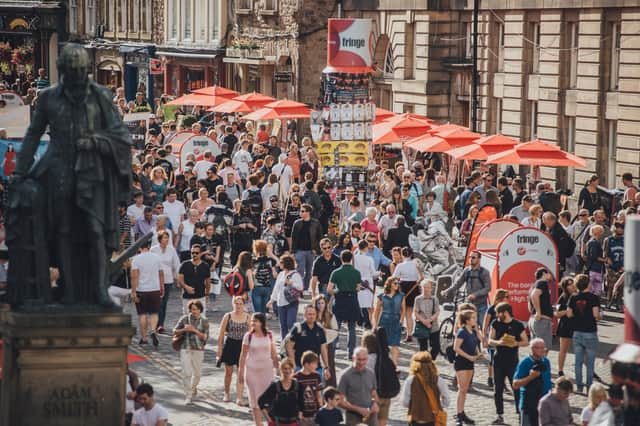Edinburgh festivals face calls for overhaul before they return in 2021


The Cockburn Association watchdog has called for pro-active crowd management measures to be put in place to ensure the city’s historic environment is properly protected after this year’s coronavirus-enforced hiatus.
Edinburgh World Heritage wants events to take steps to help conserve “the fragile environment from which they benefit so much and perhaps even leave the city in a better state than they found it in.”
Advertisement
Hide AdAdvertisement
Hide AdCouncil chiefs said the cancellation of this summer’s major events, which have attracted a combined audience of more than four million in recent years, provided an “opportunity” to shape their future direction.
The city’s two main heritage groups have spoken out less than a fortnight after the plug was pulled on the city’s August festivals due to the uncertainty caused by the virus outbreak.
Cockburn Association chair Cliff Hague said: “The summer festivals are vitally important to Edinburgh’s people, businesses and tourism brand.
“However, concerns have been growing across the city in recent years, about the scale and unintended side effects, such as overcrowded streets, the takeover of Princes Street Gardens and the squeeze on affordable housing due to the growth of short-term holiday lets and hotels.”
Edinburgh World Heritage director Adam Wilkinson said: “Part of the Edinburgh Festival’s success traces to its remarkable backdrop, which is as breathtaking as any opera set, which was one of the reasons the city was chosen for the inaugural festival in 1947.
“As we pause to take stock on what life will be like post-coronavirus, we’d hope the festivals of the future might help to conserve the fragile environment from which they benefit so much, and perhaps even leave it in a better state than they found it in.”
An official report two years ago warned councillors that the city was beginning to struggle with the volume of people converging on parts of the city centre during major events. New safety barriers and road closure put in place last summer were met with a mixed reaction.
The “pressure of huge numbers descending on the city centre” was cited as one of the key factors when Edinburgh was named one of the world’s overtourism hotspots last year, while a campaign was launched a year ago to “defend” Edinburgh against overtourism, “festivalisation” and privatisation of public space in the city centre for events.
Advertisement
Hide AdAdvertisement
Hide AdCouncil leader Adam McVey said: “The cancellation of this year’s festivals will hit our city hard but it does give us an opportunity to shape the future direction of the biggest explosion of arts and culture anywhere in the world.
“It’s clear we’ll have to work together as a city to rebuild the success Edinburgh enjoyed and it is important in doing so that we make sure the debate we have going forward is an inclusive one.
“We want all our residents to share in the city’s success and by anticipating some of the issues that we have grappled with in previous years, we can take steps to ensure we’re better prepared to address them.
“By working together we can make sure that when our festivals return, they do so with even more of a focus on our people, place and environment.”
Mike Small, spokesman for the Citizen campaign, said: “We need to do rebuild our economy away from a one-dimensional dependence on tourism and re-imagine cities as places for people to live and flourish rather than as places of profit through development and a rentier class. This will need some imagination as we have been obsessed with growth for so long.
“Culture and the arts have a vital role in helping our healing as we recover from this crisis but it is likely to be happening in an economic collapse, and people clamouring for a ‘return to normal’ are deeply deluded.
“The virus will change our city and we must build back in ways that are about equality and solidarity and citizenship.
“The re-think about who and why we put on festivals could be a profound one, or it could be a race back to where we are.
Advertisement
Hide AdAdvertisement
Hide Ad“There is an opportunity for leadership here from people in Edinburgh. A good start would be to connect with the people who live here."
However Roddy Smith, chief executive of city centre business group Essential Edinburgh, said: “There is no doubt that the city collectively needs to address some issues such as how we use our public space and how we make better use of the city as a whole for hosting events. This debate started from a position of real strength in the city.
“However the coronavirus pandemic has taken its toll on the city more than anyone could ever have predicted or thought possible.
“This has obviously hit all sectors of the economy but our tourism, events, retail, leisure and hospitality sector more than most.
“When the situation changes and it is safe for residents and tourists to congregate together Edinburgh must be ready.
“We need to reactivate the city, promote it strongly and widely and seek over the next couple of years to return to our numbers pre the virus.
“It is in everyone’s interests that we give the businesses every chance to recover and that means supporting them and marketing the city. We need our residents to return as quickly as possible, supported by visitors, national and international.
“The festivals, which are so important to our city’s residents, need to be the best yet in 2021.
Advertisement
Hide AdAdvertisement
Hide Ad“If not, the people who are saying we have become too commercial, tourist focused and crowded will be complaining about empty premises in the city centre.
“Now is the time the city needs to work together to support our economy, our businesses, our festivals and our heritage.”
Comments
Want to join the conversation? Please or to comment on this article.